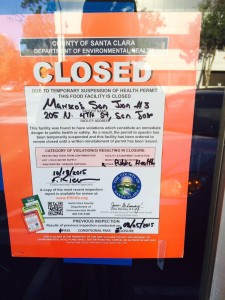Since Saturday October 17th, over 80 individuals have become acutely ill with fever, abdominal pain, and diarrhea and have been reported to the Santa Clara County Public Health Department (SCCPHD); all of these reported cases are associated with the outbreak at Mariscos San Juan restaurant #3 (205 N. 4th Street in San Jose). Many of the ill persons reported to SCCPHD have required hospital admission, of which 12 required admission to intensive care. Thus far, at least 15 of the reported cases are laboratory confirmed with Shigella (shigellosis). The investigation of this Shigella outbreak is ongoing, and lab results from additional cases are expected to arrive daily.
The restaurant was closed on the morning of Sunday, October 18th by SCCPHD and the Santa Clara County Department of Environmental Health (DEH), and it will remain closed until the safety of the public can be assured. All possible sources of contamination are currently being investigated.
Situation
On Saturday afternoon, October 17th, 2015, the Santa Clara County Public Health Department was notified by a local hospital of 5 patients with fever and diarrhea who had all eaten at the same restaurant. Subsequent case finding has revealed a total of over two dozen individuals with fever and diarrhea who ate at Mariscos San Juan restaurant (205 N. 4th Street) in downtown San Jose on Friday October 16 or Saturday October 17. The restaurant was closed on Sunday morning and remains closed. Of the ill persons, over a dozen have tested positive for Shigella by PCR, and one has a blood culture growing Shigella sonnei; almost all of the reported cases have required hospital admission, and 11 are in intensive care. There are other individuals who were seen and not admitted or who were ill but did not seek medical attention. We do not yet have antimicrobial susceptibilities on the isolate. We expect these cases represent only a small proportion of actual cases. Case finding is ongoing; we need your help to identify cases and control the spread of infection.
Background
Shigella infection can be subclinical, but typically causes watery or bloody diarrhea with abdominal pain, fever, tenesmus, and malaise. Shigella is very infectious; just 10–100 organisms are sufficient to cause disease. Transmission occurs via the fecal-oral route and can be spread by eating food prepared by an infected food handler or by direct person-to-person contact. Sexual transmission may also occur.
Young children, the elderly, and HIV-infected individuals with CD4 count <200 are more likely to have severe symptoms including dehydration, bacteremia, and seizures. Although Shigella gastroenteritis is generally self-limited, lasting 5–7 days in an immunocompetent host, untreated individuals may shed the organism in stool for up to 6 weeks. Shortening the duration of shedding with antibiotics can reduce the risk of person-to-person spread. Due to growing antimicrobial resistance in both developing and developed countries, antibiotic susceptibility testing is essential.
Actions Requested of All Clinicians:
1. Suspect Shigella gastroenteritis in persons presenting with fever and diarrhea who ate at Mariscos San Juan at the 4th Street location, or who had contact with an ill person.
2. Test with stool culture and order antimicrobial susceptibility testing. If patient is ill enough to require hospitalization, obtain blood culture.
3. Tailor therapy based on results of susceptibility testing, recognizing that routine antimicrobial susceptibility tests for Shigella may not include some commonly available oral antibiotics.
4. Report suspect cases to SCCPHD Disease Prevention and Control even before lab results come back by faxing in a Confidential Morbidity Report (CMR) https://www.sccgov.org/sites/sccphd/en-us/FindForms/Pages/DRForms.aspx, or by calling 408-885-4214 (press 1, then 3).
5. Educate patients about the importance of meticulous hand washing and avoiding any activities that could create opportunities for fecal-oral spread. If your patient is a food handler, child or elder care worker, or a healthcare worker, please notify us when you report the case.
